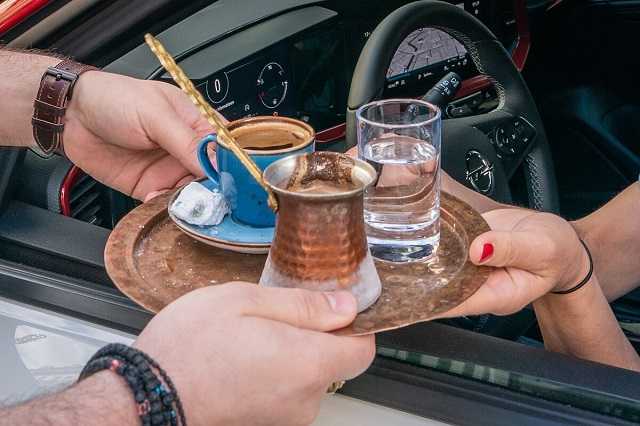RÜSSELSHEIM, Germany – A quick search of the internet will reveal that coffee is the second most popular beverage in the world, only being beaten to the top spot by water. The ongoing popularity of the aromatic drink is all the more reason to celebrate International Coffee Day on October 1.
And Opel offers the perfect companion to honour this occasion in the award-winning Opel Mokka. The smallest member of Opel’s SUV family is currently on sale in over 50 markets – from Norway in the north to South Africa in the south and from New Zealand in the east to Columbia in the west.
Opel’s stylish sub-compact SUV is available as a silky-smooth battery-electric vehicle, offering locally emissions-free mobility or with refined petrol engines, ensuring that customers can choose their preferred propulsion system – just like they would choose their favourite coffee.
Ever since its launch in 2020, the Opel Mokka has been turning heads. As a car designed to arouse emotions, the Opel Mokka was the first to wear the new brand face, the Opel Vizor. It was also the first Opel with the Pure Panel and a fully digitised cockpit.
The battery-electric Opel Mokka Electric, winner of the renowned Golden Steering Wheel¹ in Germany in 2021, impresses not only with its bold and pure design, but also with its performance. The electric motor with 100 kW/136 hp and 260 Newton metres of maximum torque delivers a powerful, almost silent drive. Up to 338 kilometres of locally emissions-free travel are possible on a single charge of the 50-kWh battery according to WLTP². The electronically limited top speed is 150 km/h.
Depending on their preference, Mokka Electric drivers can choose between the three driving modes Eco, Normal and Sport. In Eco mode, the electric SUV is most energy-efficient in favour of the overall range. Thanks to a state-of-the-art regenerative braking system, the Mokka Electric can also recuperate energy when decelerating or braking. The electric motor then acts as a generator to charge the battery. If the driver shifts the transmission into the B mode, recuperation and braking torque increase. The battery can be quickly “refilled” to 80 per cent state-of-charge in around 30 minutes at a 100 kW DC charging station.
The lively yet economical petrol engines offer power outputs ranging from 74 kW (100 hp) to 100 kW (136 hp). Moderate fuel consumption and superior performance are characteristic of all powertrains (combined fuel consumption WLTP: 6.2-5.2 l/100km, 141-117 g/km CO2)³. High efficiency is typical of the engines, internal friction and losses are minimised. The turbocharger also responds immediately, with strong torque development at low rpm. The engines come with a six-speed manual gearbox or a smooth-shifting eight-speed automatic with shift paddles.
The Mokka also stays true to Opel’s brand-defining tradition of making innovative technologies from higher market segments available to a wide range of buyers. These include “high-tech” such as Active Drive Assist – including Advanced Cruise Control (ACC) and Active Lane Positioning. The lighting system is also state-of-the-art with the adaptive and therefore glare-free Intelli-Lux LED® matrix light featuring 14 elements. All model variants come as standard with an electric parking brake as well as Traffic Sign Recognition. A 180-degree Rear View Camera, Automatic Park Assist, Flank Guard and Side Blind Spot Alert are also available.
With its combination of its bold design, the choice between battery-electric propulsion or internal combustion engines along with innovative technologies, the Opel Mokka has long since become a hit with customers – just like coffee.
[1] AUTO BILD edition 45/2021 and BILD am SONNTAG edition 46/2021, category for “Best car under €25,000” incl. environmental bonus.>>
[2] Range determined according to WLTP test procedure methodology (R (EC) No. 715/2007, R (EU) No. 2017/1151). The actual range can vary under everyday conditions and depends on various factors, in particular on personal driving style, route characteristics, outside temperature, use of heating and air conditioning and thermal preconditioning.>>
[3] The fuel consumption and CO2 emissions figures mentioned comply with the WLTP homologation (regulation EU 2017/948). From 1 September 2018, new vehicles are type-approved using the World Harmonised Light Vehicle Test Procedure (WLTP), which is a new, more realistic test procedure for measuring fuel consumption and CO2 emissions. The WLTP fully replaces the New European Drive Cycle (NEDC), which was the test procedure used previously. Due to more realistic test conditions, the fuel consumption and CO2 emissions measured under the WLTP are in many cases higher compared to those measured under the NEDC. The fuel consumption and CO2 emissions figures may vary depending on specific equipment, options and format of tires.>>


















